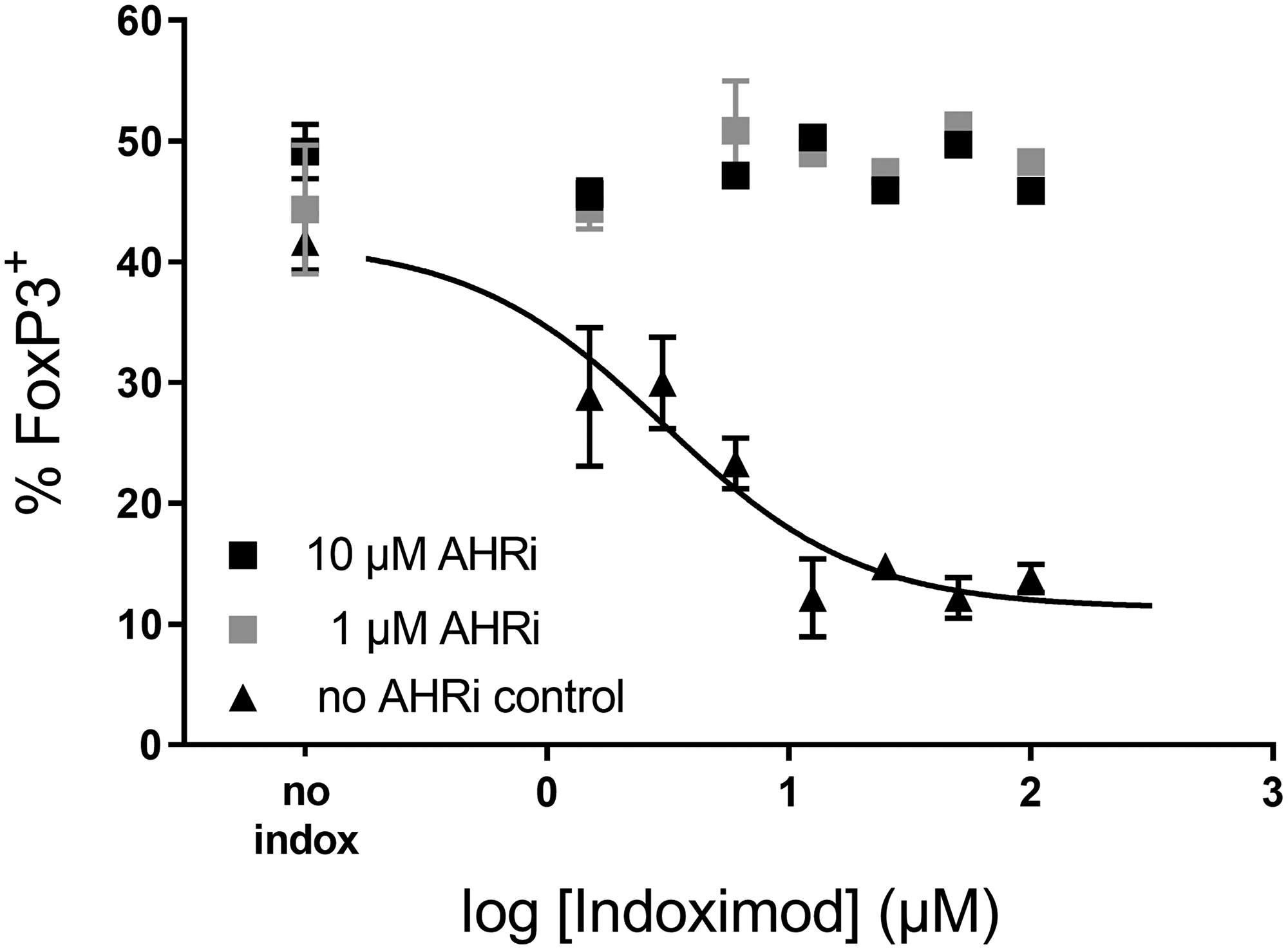Volume 11 Issue 25 of @Oncotarget reported that Indoximod has shaped the understanding of the biology of IDO1 in the control of immune responses, though its mechanism of action has been poorly understood.
Indoximod can have a direct effect on T cells, increasing their proliferation as a result of mTOR reactivation.
Further, indoximod modulates the differentiation of CD4+ T cells via the aryl hydrocarbon receptor, which controls transcription of several genes in response to different ligands including kynurenine.
Indoximod increases the transcription of RORC while inhibiting transcription of FOXP3, thus favoring differentiation to IL-17-producing helper T cells and inhibiting the differentiation of regulatory T cells.
Indoximod can also downregulate expression of IDO protein in vivo in murine lymph node dendritic cells and in vitro in human monocyte-derived dendritic cells via a mechanism that involves signaling through the Ah R. Together, these data improve the understanding of how indoximod influences the effects of IDO, beyond and distinct from direct enzymatic inhibition of the enzyme.
"Together, these data improve the understanding of how indoximod influences the effects of IDO, beyond and distinct from direct enzymatic inhibition of the enzyme"
Dr. Erik L. Brincks from NewLink Genetics Corporation as well as Lumos Pharma, Inc. said "Indoleamine 2,3-dioxygenase (IDO1) plays an important role in the regulation of acquired local and peripheral immune tolerance in normal and pathological scenarios."
In cancer, IDO1 can be expressed either directly by the tumor cells or induced indirectly in host antigen presenting cells by the tumor.
IDO1 expression by tumor cells has been associated with significantly worse clinical prognosis and reduced survival in malignant melanoma, pancreatic cancer, ovarian cancer, both pediatric and adult acute myelogenous leukemia, colorectal cancer, prostate cancer, endometrial cancer, and others.
The cellular pharmacodynamic effects of IDO1 activity include the inhibition of antigen-specific CD8+ T cell proliferation, stimulation of differentiation of na�ve CD4+ T cells to Fox P3+ regulatory T cells, the activation of Tregs, and the recruitment of MDSC to the tumor.

Figure 8: Indoximod effect on CD4+ T cell differentiation is inhibited by AhR inhibitors. Human CD4+ T cells were stimulated for 5 days with anti-CD3/CD28 in the presence of 100 μM Kyn to enhance their differentiation into Treg cells. Addition of the AhR inhibitor CH223191 (either 10 μM or 1 μM) reverses the effect of indoximod. Representative data selected from Exp 40 (Table 1).
Both isomers are capable of restoring T-cell proliferation in an MLR assay with IDO+ dendritic cells as the stimulator cells, or in syngeneic antigen-dependent T-cell proliferation assays using IDO+ dendritic cells isolated from tumor-draining lymph nodes.
L1m T is a competitive inhibitor and substrate of IDO1 enzymatic activity in cell-free assays using purified recombinant IDO1 enzyme, and in tumor cells treated with INFγ or in tumor cell lines transfected with expression vectors that encode IDO1 under the control of an heterologous promoter.
The Brincks Research Team concluded in their Oncotarget Research Paper that these effects are independent on the Trp metabolizing activity of IDO and/or TDO but happen to oppose the effects of the enzymatic activity of IDO and TDO by multiple mechanisms that act on cell types commonly affected by the IDO and TDO pathways.
Indoximod creates a Trp-sufficiency signal which leads to reactivation of MAP4K3 which leads to activation of mTORC1 activity, thus opposing and bypassing the effects of Trp deprivation that lead to GCN2 activation and MAP4K3 and mTOR inactivation.
This effect requires a relatively high concentration of indoximod, is observed in both CD4+ and CD8+ T cells and leads to an increase in the proliferative capacity of activated effector and helper T cells.
This effect takes place at clinically relevant concentrations of indoximod and is independent of IDO/TDO activity or exogenous Kyn, though it happens to oppose the Kyn/Ah R effects on T cell differentiation.
Indoximod can downregulate IDO1 protein expression in dendritic cells, with potency of approximately 20 μM, via a mechanism that involves the function of Ah R thus exerting a true IDO pathway inhibitory function, by blocking both the enzymatic and non-enzymatic signaling functions of IDO1 that contribute to T cell anergy, to the reduction of effector T cell proliferation, and to the promotion of regulatory T cell activation and differentiation.
Sign up for free Altmetric alerts about this article
DOI - https://doi.org/10.18632/oncotarget.27646
Full text - https://www.oncotarget.com/article/27646/text/
Correspondence to - Erik L. Brincks - [email protected]
Keywords - indoximod, IDO, TDO, AhR, mTORC1
About Oncotarget
Oncotarget is a biweekly, peer-reviewed, open access biomedical journal covering research on all aspects of oncology.
To learn more about Oncotarget, please visit https://www.oncotarget.com or connect with:
SoundCloud - https://soundcloud.com/oncotarget
Facebook - https://www.facebook.com/Oncotarget/
Twitter - https://twitter.com/oncotarget
LinkedIn - https://www.linkedin.com/company/oncotarget
Pinterest - https://www.pinterest.com/oncotarget/
Reddit - https://www.reddit.com/user/Oncotarget/
Oncotarget is published by Impact Journals, LLC please visit http://www.ImpactJournals.com or connect with @ImpactJrnls
Media Contact
[email protected]
18009220957x105



